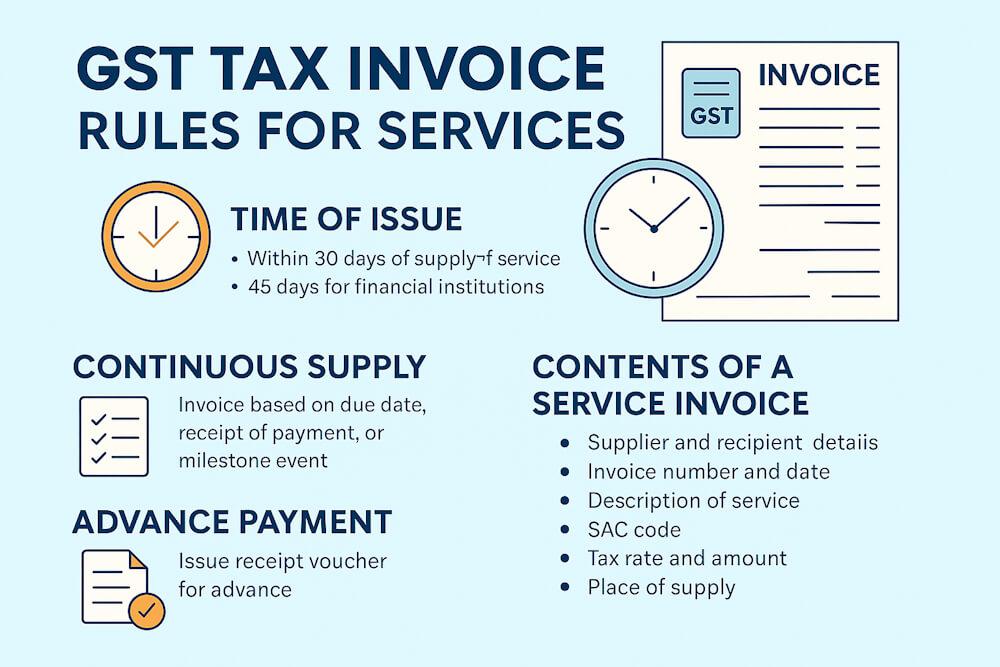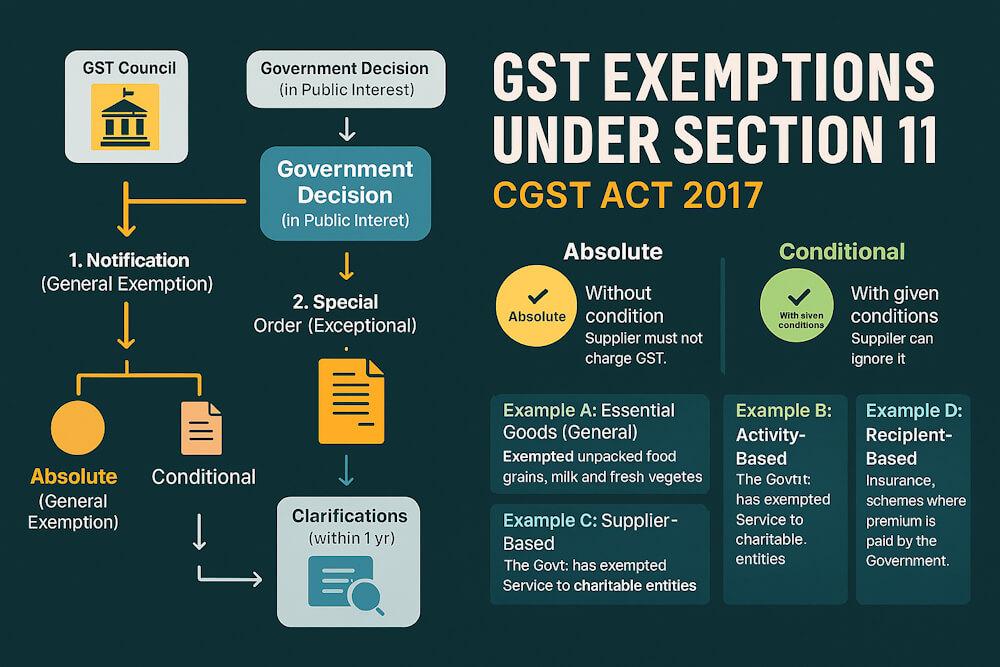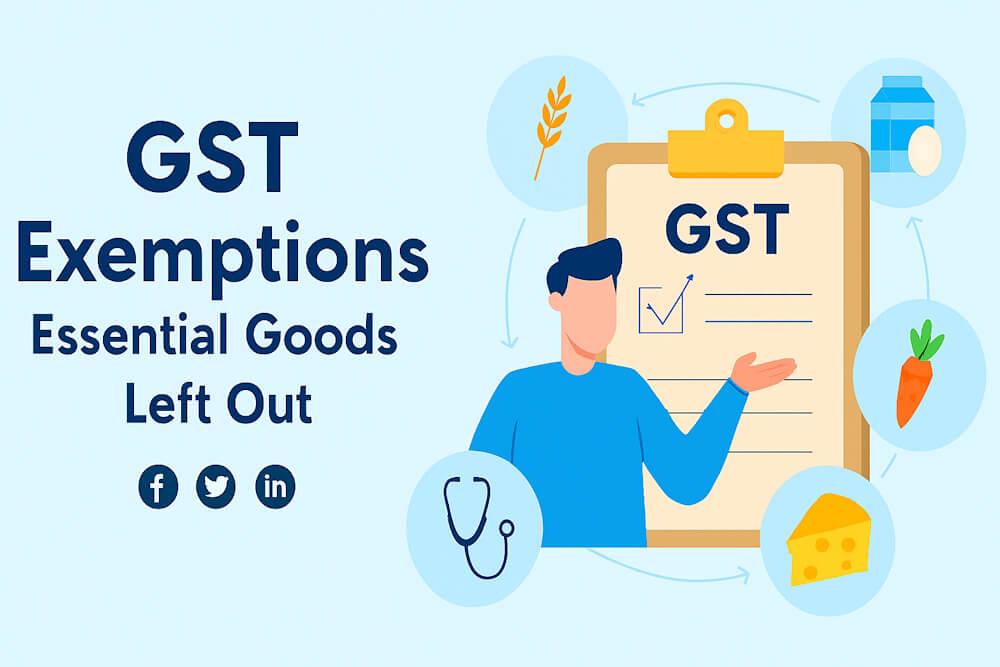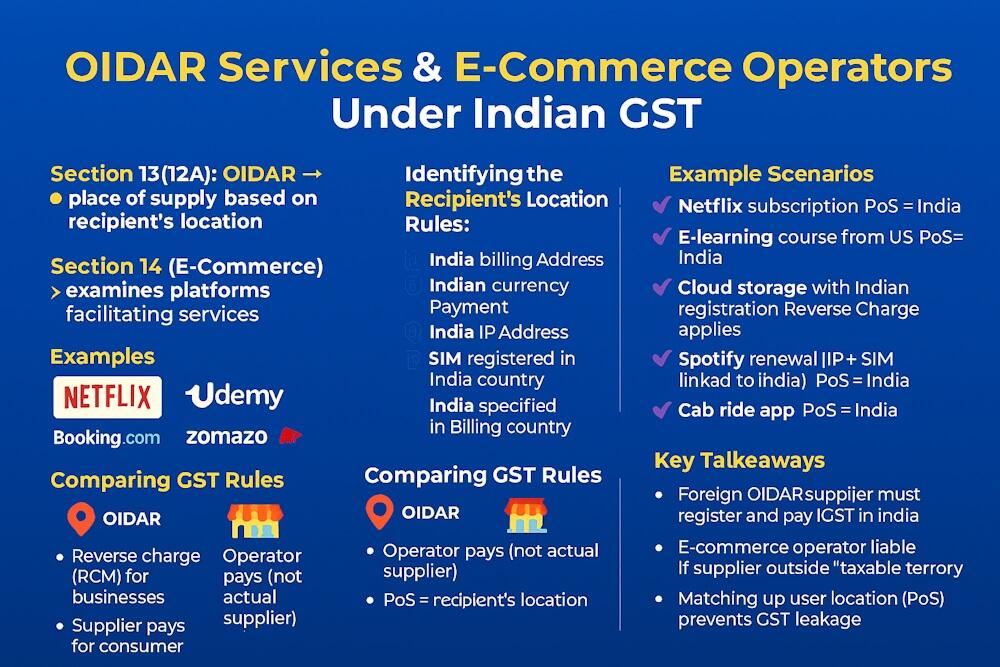1. Introduction
Transportation services are the backbone of India’s supply chain — from e-commerce deliveries to aviation, from logistics fleets to passenger travel. But when goods or passengers move across State borders, one confusion arises:
Which State should get the GST?
Where goods start? Where they end? Or where the passenger belongs?
To clear this, GST law has two important provisions:
- Section 12(8) → Transportation of goods
- Section 12(9) → Transportation of passengers
This blog explains both in the simplest possible way — with examples, visuals, and latest updates.
2. Law Summary (Short & Simple)
| Service Type | Section | Rule for Place of Supply |
| Transport of Goods | 12(8) | Registered recipient → recipient location; Unregistered → place where goods handed over |
| Transport of Passengers | 12(9) | Registered recipient → recipient location; Unregistered → place where passenger embarks |
Just two rules — based on registered vs. unregistered.
SECTION 12(8): Place of Supply for Transportation of Goods
This includes:
- Road transport
- Air cargo
- Rail freight
- Parcel delivery services
- Courier and express logistics
Rule Breakdown
| Recipient Type | Place of Supply | Why? |
| Registered | Location of recipient | B2B business consumption |
| Unregistered | Location where goods handed over to transporter | Physical handover = point of supply |
Examples for Transportation of Goods
Example 1 – B2B Transport (Recipient Registered)
LogiTrans (Delhi) transports goods for a company registered in Ahmedabad. Goods picked up in Mumbai and delivered in Jaipur.
- Recipient registered → PoS = Ahmedabad
- Tax Type = IGST (Delhi → Ahmedabad)
Even though goods traveled multiple States, PoS follows recipient location.
Example 2 – B2C Goods Transport (Recipient Unregistered)
Courier service from Kolkata collects parcels from an unregistered customer and delivers to Patna.
- PoS = Where goods were handed over = Kolkata
- Tax Type = CGST + SGST (West Bengal)
Example 3 – Goods Transport for Export
Transport from Ludhiana to Mumbai Port, then exported outside India. Recipient is GST-registered in Ludhiana.
- PoS = Ludhiana (recipient location)
- Tax Type = IGST
- Supply may be zero-rated, subject to LUT/refund conditions
Export destination does not decide PoS.
Example 4 – Courier Charges Paid by Recipient
Goods handed over in Bengaluru, delivered to Chennai. Recipient in Chennai pays courier fee (registered).
- PoS = Chennai
- IGST
Because recipient is registered → follow recipient location.
Example 5 – Inland Waterway Goods Transport
Boat transport from Kochi to Kollam. Recipient unregistered.
- PoS = Kochi (handover point)
- CGST + SGST (Kerala)
SECTION 12(9): Place of Supply for Passenger Transportation
This includes:
- Bus, taxi, auto rides
- Air passenger travel
- Train journeys
- Metro & ferry services
- Tourist vehicle hire
Rule Breakdown
| Recipient Type | Place of Supply |
| Registered | Recipient’s location |
| Unregistered | Where passenger embarks (boards the vehicle)** |
Boarding location matters — not destination, not ticket booking site.
Examples for Passenger Transport Services
Example 1 – Flight for a Registered Business (B2B)
XYZ Pvt. Ltd. (Registered in Bengaluru) books a Delhi → Mumbai flight for its employee.
- PoS = Bengaluru (recipient location)
- IGST (if airline registered in another State)
Even if boarding happens in Delhi, PoS follows recipient (company).
Example 2 – Flight for Individual (Unregistered)
Passenger boards a flight from Chennai → Hyderabad. Ticket booked online.
- PoS = Chennai (place of embarkation)
- CGST + SGST (Tamil Nadu)
Origin decides the tax — not booking location.
Example 3 – Metro Ticket
Metro ride in Kolkata by a regular commuter (unregistered).
✅ PoS = Kolkata ✅ CGST + SGST (West Bengal)
Example 4 – Multiple Destinations Round Trip
Passenger boards in Ahmedabad → travels to Surat → returns to Ahmedabad (Unregistered recipient)
- PoS = Ahmedabad (first embarkation)
- CGST + SGST (Gujarat)
Example 5 – International Passenger Transport
A person boards in Delhi for a flight to Dubai (unregistered).
- PoS = Delhi (place of embarkation)
- IGST applicable (as international journey)
GST applies on India portion as per airline tax splitting rules.
Quick Rule Comparison (Goods vs. Passenger Transport)
| Parameter | Goods Transport (12(8)) | Passenger Transport (12(9)) |
| B2B | Recipient location | Recipient location |
| B2C | Goods handover point | Place of boarding |
| Movement relevance | Handover point matters | Travel start point matters |
| Export/International | PoS remains in India | PoS = embarkation in India |
Special Case: Chartering a Vehicle or Booking Entire Aircraft
If a company hires an entire bus/charter for employees → Section 12(2) (general rule) applies.
- PoS = location of the recipient
This differs from ordinary passenger tickets.
E-Commerce Logistics & Courier Aggregators
Rule still follows recipient registration status, not booking platform. Example: Courier booked via Shiprocket → If recipient registered → PoS = recipient location
Latest CBIC Clarifications & GST Updates (2024–25)
| Circular/Notification | Date | Update Summary |
| Circular 209/3/2024 | July 2024 | Clarified PoS for online passenger ticketing = first embarkation |
| Notification 09/2024-IGST | Oct 2024 | B2B transport always follows recipient GSTIN location |
| e-Invoice Update | 2024 | Mandatory PoS state code based on boarding/handover location |
Common Mistakes to Avoid
- Charging based on delivery location for goods transport
- Incorrect PoS when tickets booked in different States
- Ignoring recipient GSTIN for corporate freight
- Treating employee journey as B2C (should be B2B)
- Wrong State Code for multi-State transport invoices
Documentation Checklist
- Waybill/Consignment Note (for goods)
- Passenger ticket with embarkation info
- Transport contract mentioning pickup location
- Recipient GSTIN for B2B
- Correct PoS on e-invoice
Real-World Case Studies
| Case | Scenario | PoS Rule | Result |
| Logistics for Company | Goods transported to another State | B2B → Recipient location | IGST |
| Courier for Individuals | Unregistered sender | Handover point | Local CGST+SGST |
| Domestic Air Ticket | Passenger boards in Jaipur | Boarding location | Rajasthan tax |
| Export Freight | Goods sent to port | Recipient location | Zero-rated allowed |
Final Summary Table
| Clause | Applies To | If Registered | If Unregistered |
| 12(8) | Goods transport | Recipient location | Handover place |
| 12(9) | Passenger transport | Recipient location | Boarding location |
Key Takeaways
- Goods → Follow who pays
- Passengers → Follow where they board
- Movement does NOT decide PoS
- Export transit still taxed based on Indian recipient
- Correct PoS = GST compliance + no penalties
Final Thoughts
Transportation fuels India’s economic growth — and GST rules ensure the right State earns tax at the right time.
The golden rule is easy:
“🚌 Passenger Transport → “Where the journey begins”🚚 Goods Transport → “Who you are supplying to””
Once you master this, GST for transport services becomes smooth and audit-friendly.





